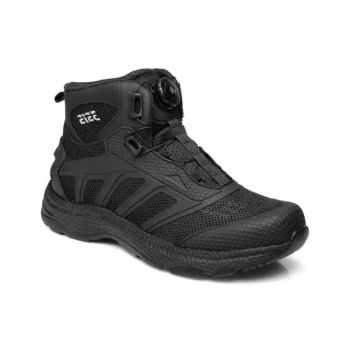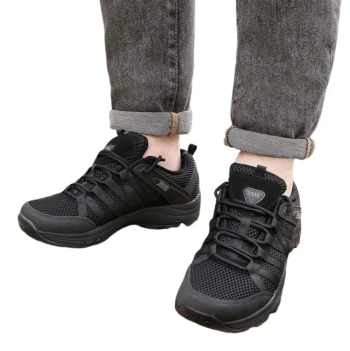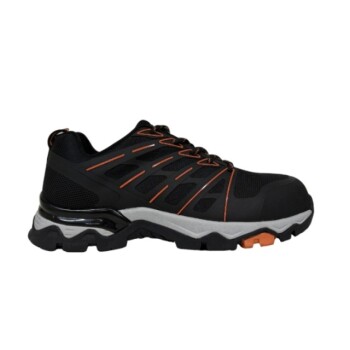Walking barefoot on hard, flat surfaces for extended periods is harmful because it forces your foot's natural arch to collapse. This unnatural flattening, known as prolonged pronation, creates a chain reaction of excessive stress that travels from your feet through your legs and up into the rest of your body, leading to pain and injury.
The core issue is a mismatch between our evolutionary design and our modern environment. Feet are built to adapt to soft, uneven terrain like soil and sand; unforgiving surfaces like concrete and tile force the foot into a structurally weak position, disrupting your body's entire biomechanical alignment.
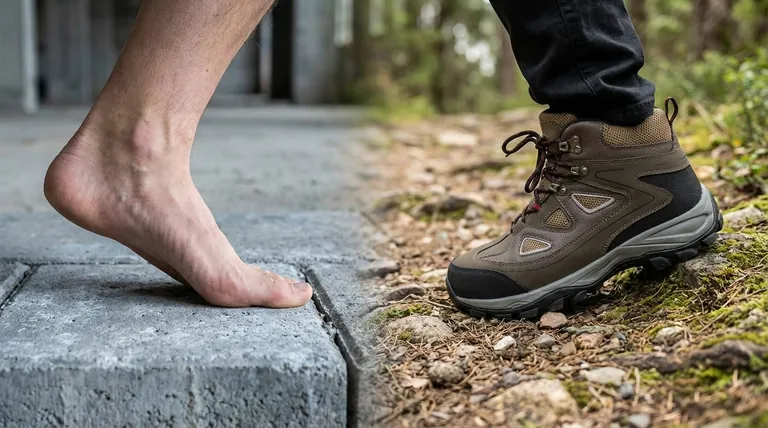
The Core Problem: Foot Collapse and Pronation
Our feet are marvels of engineering, designed to act as natural shock absorbers. However, their effectiveness is highly dependent on the surface they interact with.
Natural vs. Artificial Surfaces
Feet evolved to walk on natural, yielding ground. Surfaces like grass, dirt, and sand conform to the foot, supporting the arch and engaging the small, intrinsic muscles responsible for stability.
Hard, flat surfaces like concrete, tile, and hardwood floors do the opposite. They offer no give, forcing the foot to flatten completely to maximize contact and absorb shock.
The Mechanics of "Foot Collapse"
When you walk barefoot on a hard floor, the arch of your foot receives no support. With each step, it flattens out, and the ankle tends to roll inward. This is often referred to as foot collapse or overpronation.
This repetitive collapse places immense strain on the ligaments and tendons that are meant to maintain your foot's structure.
What is Prolonged Pronation?
Pronation—the natural inward roll of the foot during the gait cycle—is a normal and necessary motion for shock absorption. The problem arises when this motion becomes excessive and prolonged.
On hard surfaces, the foot stays in this pronated, collapsed state for too long. This alters the foot's pressure distribution and changes the mechanics of how you walk, setting the stage for injury.
The Cascade Effect: How Foot Stress Travels Up the Body
An unstable foundation in the feet inevitably creates problems further up the body's kinetic chain. The compensation required to walk on a collapsed foot leads to a variety of stress-related conditions.
Immediate Foot and Ankle Issues
The most direct consequences occur in the foot itself. The strain from overpronation is a primary cause of arch and heel pain (Plantar Fasciitis), Posterior Tibial Tendonitis, and Achilles tendonitis.
Worsening of Structural Deformities
If you have existing foot conditions, walking barefoot on hard surfaces can make them worse. The altered pressure can accelerate the progression of deformities like bunions and hammertoes.
Stress on the Lower Leg
The body tries to correct for the foot's instability. Muscles in the lower leg, particularly those in the shin, must work overtime to control the foot's motion, which is a common cause of shin splints.
Understanding the Trade-offs
The guidance to avoid walking barefoot is not absolute; it is highly context-dependent. The key variable is the surface you are walking on.
The Benefit of Natural Surfaces
Walking barefoot on soft surfaces like sand or grass can be beneficial. It helps strengthen the intrinsic muscles of the feet, improves balance, and enhances sensory feedback from the ground (proprioception).
The Key Differentiator: Yield vs. Rigidity
The critical distinction is whether the surface yields to your foot or your foot is forced to yield to the surface. Soft ground supports the arch, while hard ground destabilizes it.
The Danger of Impact
Beyond the biomechanical strain, hard surfaces offer zero shock absorption. This means the full impact force of each step is transmitted directly into your bones, joints, and ligaments, increasing the risk of stress-related injuries over time.
Making the Right Choice for Your Foot Health
Your approach to going barefoot should be determined by your environment and your goals.
- If your primary focus is strengthening your feet: Engage in barefoot activity for short periods on soft, safe, natural surfaces like a grassy lawn or sandy beach.
- If your primary focus is avoiding pain in daily life: Wear supportive shoes or slippers inside your home, especially if you have hard flooring.
- If you are already experiencing foot, shin, or knee pain: Avoid walking barefoot on any hard surface and consult a podiatrist to address the underlying biomechanical issue.
Understanding the relationship between your feet and your environment is the first step toward building a resilient foundation for your entire body.
Summary Table:
| Potential Consequence | Key Symptoms & Conditions |
|---|---|
| Foot & Ankle | Plantar Fasciitis, Posterior Tibial Tendonitis, Achilles Tendonitis |
| Structural Issues | Worsening of bunions and hammertoes |
| Lower Body Stress | Shin splints, altered gait, knee and hip pain |
| Root Cause | Prolonged pronation from lack of arch support on unyielding surfaces |
Need durable, supportive footwear for your customers or brand? As a large-scale manufacturer, 3515 produces a comprehensive range of footwear designed to provide proper arch support and stability. We help distributors, brand owners, and bulk clients deliver shoes that protect against the harmful effects of hard surfaces. Contact us today to discuss your production needs and build a foundation of foot health for your market.
Visual Guide
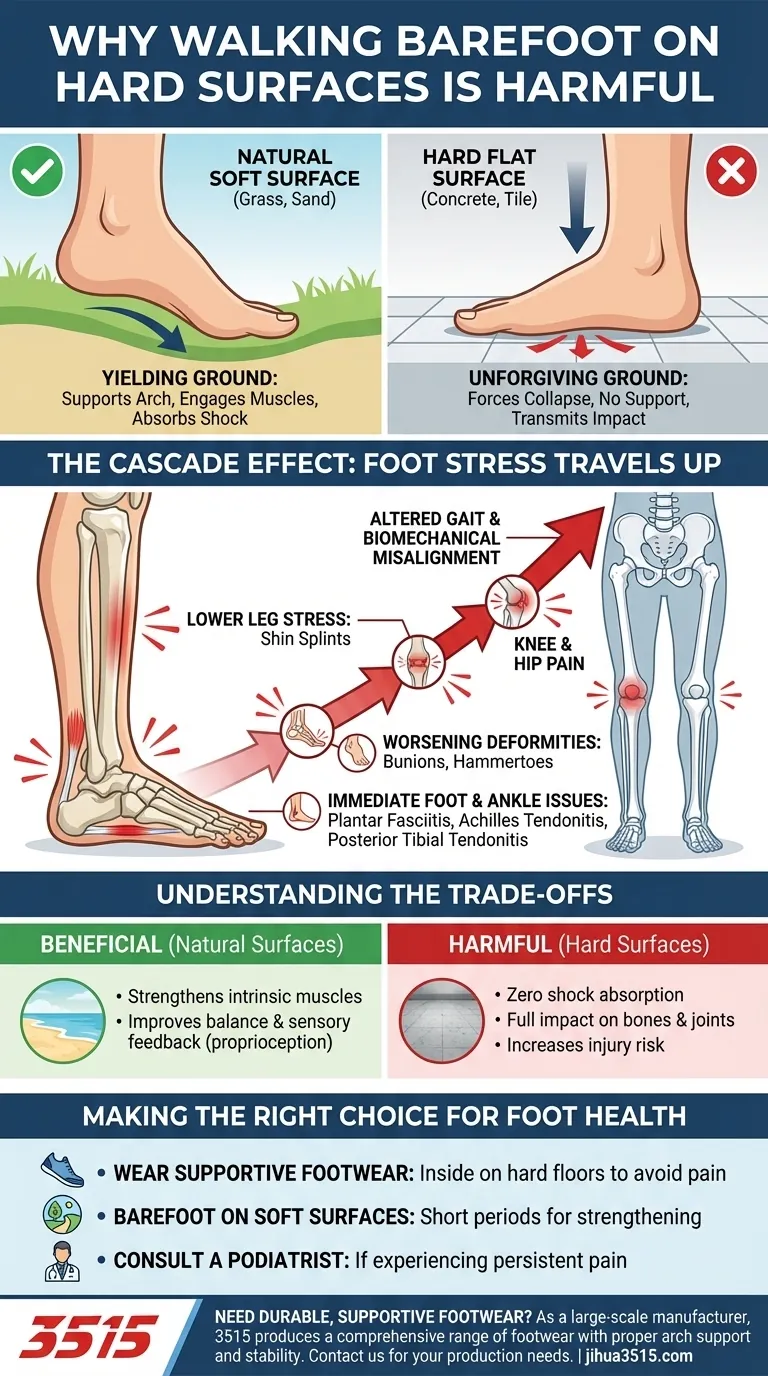
Related Products
- Safety Footwear Wholesale Manufacturer for Custom OEM/ODM Production
- Wholesale Safety Footwear Manufacturer for Bulk & Custom OEM Orders
- Wholesale Lightweight Tactical Boots with Dial Closure OEM & Bulk Orders
- Lightweight Breathable Training Shoes for Wholesale & Custom OEM Manufacturing
- Durable Canvas Work Shoes with Rubber Lug Sole | Wholesale Manufacturer
People Also Ask
- Do snake bite boots work? Your Ultimate Guide to Effective Snake Bite Protection
- What cultural and environmental considerations are tied to wearing shoes indoors? Balance Hygiene, Tradition, and Foot Health
- Is it normal to wear shoes in the house? A Guide to Hygiene, Comfort & Culture
- What are the cultural perspectives on wearing shoes in the house? A Guide to Home Etiquette & Hygiene
- What do heavy duty boots do? Protect Your Feet in Demanding Work Environments


